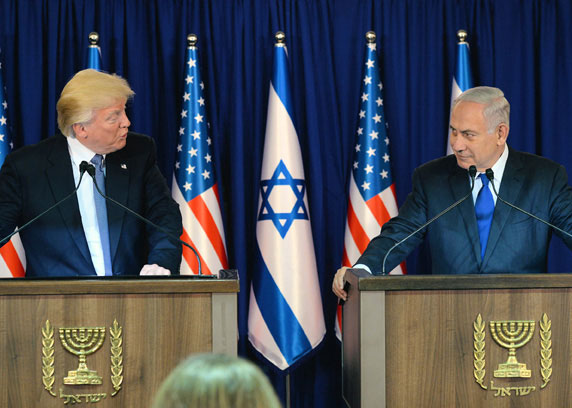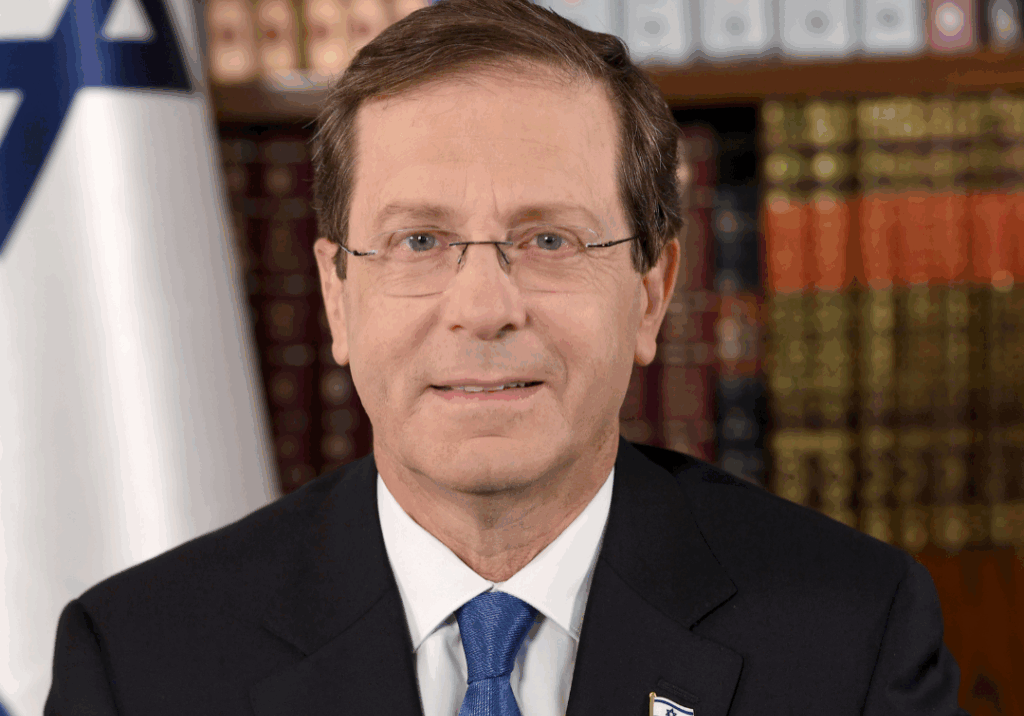Australia/Israel Review
Trump wins friends in Israel
Jun 2, 2017 | David Horovitz

David Horovitz
Surely nobody but Donald J. Trump could get a warm laugh from an audience of Israeli notables within seconds of highlighting the Iranian regime’s desire to destroy our country. That’s what happened deep into the main speech of the President’s May 22-23 Israel visit, at the Israel Museum in Jerusalem.
“Iran’s leaders routinely call for Israel’s destruction,” he said bleakly and bitterly, reading from the teleprompters. Then he departed from his prepared text, and added: “Not with Donald J. Trump, believe me.”
The remark was met with cheers and a standing ovation. Netanyahu, on his feet, pumped a fist.
“Thank you,” said the US President three times as he waited patiently for the clapping to stop. And then, waving a hand out toward his audience, with a smile, he said, “I like you too.”
Those few seconds rather summed up Trump’s visit to Israel – his expressions of instinctive solidarity with the Jewish state, his vow to protect it, and the delight with which the country hosted him – after eight years of what Israelis always felt was somewhat conditional, caveat-filled support from President Obama.
There are clear differences on the Palestinian issue between the US President and the Government of Prime Minister Benjamin Netanyahu. They were on display in the two leaders’ Israel Museum speeches.
Netanyahu noted that if Monday evening’s Manchester terrorist attack had been carried out by a Palestinian suicide bomber and had killed Israelis, then Mahmoud Abbas, far from condemning it alongside Trump in Bethlehem earlier Tuesday, would have been making payments to the terrorist’s family.
Trump, by complete contrast, asserted with conviction that Abbas and the Palestinians “are ready to reach for peace.” Again departing from the prepared text, he sought to counter Israelis’ scepticism: “I know you’ve heard it before. I am telling you… They are ready to reach for peace.”
Netanyahu wants to believe Israel can make peace with the Arab world, and that many of the Arab leaders with whom Trump met in Riyadh will then, later, chivvy the Palestinians toward terms for a deal that Israel can safely accept. Trump, by contrast, has evidently been persuaded that the process needs to work the other way around. On the basis of his conversations in Riyadh, he indicated, “I also firmly believe that if Israel and the Palestinians can make peace, it will begin a process of peace all throughout the Middle East.”
There is also some disappointment on the right of the Israeli political spectrum that Trump has yet to honour his campaign pledge to relocate the US Embassy from Tel Aviv to Jerusalem. Disappointment that he hasn’t moved to try to scrap the lousy Iran nuclear deal.
There are some concerns about the scale of the arms deals and other agreements he concluded in Saudi Arabia, and the sway that US$380 billion of investments gives the Saudis in Washington. There is reportedly dismay in the intelligence establishment about his apparent leaking of Israeli intel to the Russians, and the overall question of his ties with Russia, ally of so many of Israel’s enemies. And there were many, certainly including Netanyahu, who hoped he would take a far tougher line with Abbas on the PA hierarchy’s salaries to terrorists in particular.
But as the visit wound up, the overall sense in Israel was one of considerable content with a visit by a patently supportive President and his Israel-loving family (some of them Jewish).
It was also interesting to see quite how comfortable Netanyahu evidently felt in Trump’s company – quite the contrast to all those tense meetings with Obama.
He didn’t move the Embassy, but his Israel Museum speech was surely the most resonant address by a US President in endorsing Israel’s legitimacy in its capital – a lengthy, emotional and considered rebuttal of all those ludicrous UNESCO resolutions that deny Jewish history in the city. “Jerusalem is a sacred city. Its beauty, splendour, and heritage are like no other place on earth,” Trump declared, “The ties of the Jewish people to this Holy Land are ancient and eternal. They date back thousands of years, including the reign of King David whose star now flies proudly on Israel’s white and blue flag.”
And those words, of course, were underpinned by his history-making action – as the first serving US president to visit the Western Wall.
Israelis know no more than Americans about how Trump’s presidency will play out from here. They cannot be sure of what he will say or do – or how what he has already said and done will impact his term.
But he came to Jerusalem. He told Israel he loved it. He empathised with the challenges it faces. He praised Israel for thriving while under constant attack. He vowed to stand with Israel against Iran and to ensure that Teheran never gets a nuclear weapon. And again, he stood in respect at the Jews’ most holy place of prayer.
Peace plans and other specifics? Not this time.
Frictions and arguments ahead? Who knows?
But mutual affection? For now, certainly. In the enthusiastic aftermath of this visit, as Trump headed off to the Vatican on the afternoon of May 23, many Israelis were likely thinking, yes, we like you, too.
David Horovitz is Editor in Chief of the Times of Israel. © Times of Israel, all rights reserved, reprinted by permission.
Tags: Israel






